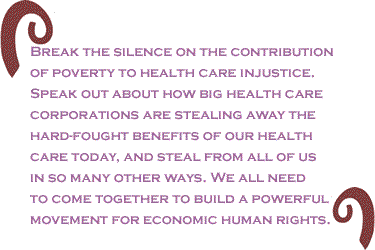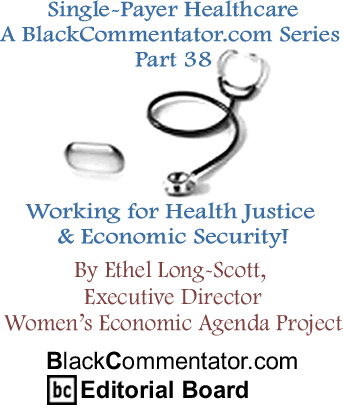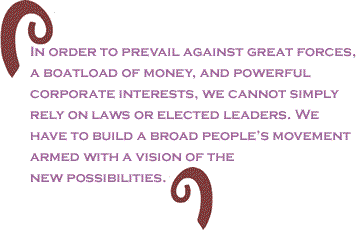
|
||||||||||||||||||||||
 |
||||||||||||||||||||||
 |
||||||||||||||||||||||
 |
||||||||||||||||||||||
 |
||||||||||||||||||||||
 |
||||||||||||||||||||||
 |
| The current issue is always free to everyone |
|
|
 |
| Our nation is being presented with an amazing opportunity right now. We have the resources to give good health care to everyone who lives here. We have the opportunity to end the agonizing worry and unnecessary suffering of so many people about their health care. What stands in the way is a time-honored idea that modern technology has made as outmoded and backward as the horse and buggy transportation we used to depend on. It’s the idea that nothing should be done unless some company can make a profit on it. We no longer need the idea of making profits off other people’s misery. Health care is in the same place that education was when Alabama’s George Wallace and other segregationist governors were standing in the schoolhouse door shouting “NEVER!”. People believed the four-term governor when he shouted out “segregation today, segregation tomorrow, segregation forever.” There were huge public policy arguments over whether school integration would destroy American society. The segregationists spent huge amounts of time and money defending the only way of life they had ever known – even though its time was gone.
What lessons can we draw from the way earlier generations seized opportunities for positive change, despite formidable opposition? In order to prevail against great forces, a boatload of money, and powerful corporate interests, we cannot simply rely on laws or elected leaders. We have to build a broad people’s movement armed with a vision of the new possibilities. In health care, this means talking up the United Nations declaration that decent health is a human right, for everyone, not just for people who can afford expensive medical care. And it means speaking up for single payer universal health care as the only form of health care that will secure true adequate health care for everyone.
It also means seeing health care reform as part of a working class struggle for survival. Why? Because just as segregation was a social policy designed to keep African Americans and other non-whites from advancing, the social policy that benefits corporate profits today is designed to drive workers lower and lower on the economic scale. This has produced tremendous class stratifications in our country that cannot be papered over. There is a growing new class of workers made up of part-time, contingency, undocumented and low-wage workers with limited or no benefits, as well as unemployed, disabled and retired workers whose rights to employment-based healthcare have been destroyed. While women, African Americans and other historically dispossessed groups are hit disproportionately hard by the efforts to drive workers’ wages and benefits down, it’s important to see that all workers are at risk.
What it will take to change this situation is a broad social movement, informed by a forward-looking vision of a new American social contract and a new strategy for working class independence. Only a movement focused on the needs of the most threatened workers will get us the health justice we need. And only such a movement can insure that good public policy aimed at remedying this broken health care system will be secured.
Any new vision of the better life that technology is making possible must be aware of when so-called “health reform” are nothing more than distractions designed to keep the old systems in place just a little longer. One of those phony distractions is called the “Individual Mandate” and we need to speak out against it. Here’s what we need to know about the Individual Mandates many states are moving toward:
What can you do? Here are some practical ways to help build this movement for health care justice. Some of them may seem small, but they add up:
I am reminded that before Dr. Martin Luther King was killed in 1968, he switched his focus from civil rights to economic rights. That idea scared a lot of the people around him. They saw poverty everywhere and didn’t see how you could fight it. Dr. King was killed before he could get his poor people’s movement fully organized. But the idea of a poor people’s movement wouldn’t die because it really was the answer. The Poor People’s Economic Human Rights Campaign, which WEAP hosts, carries on in that tradition. Click here to read any of the reports in this series. BlackCommentator.com
Editorial Board
member, Ethel Long-Scott, is the Executive Director of the Women's
Economic Agenda Project, (WEAP). She is known nationally and internationally for devoting
her life to the education and leadership of people at the losing
end of society, especially women of color. She is dedicated
to economic security and justice and believes that the
|
Your comments are always welcome. e-Mail
re-print notice
If you send us an e-Mail message we may publish all or part of it, unless you tell us it is not for publication. You may also request that we withhold your name. Thank you very much for your readership. |
|
| May
15, 2008 Issue 277 |
|
| Executive Editor: Bill Fletcher, Jr. |
| Managing
Editor: |
| Publisher: Peter Gamble |
| Est. April 5, 2002 |
| Printer Friendly Version in resizeable plain text format or pdf format. |
 |
 |
 |
| |
| |


































